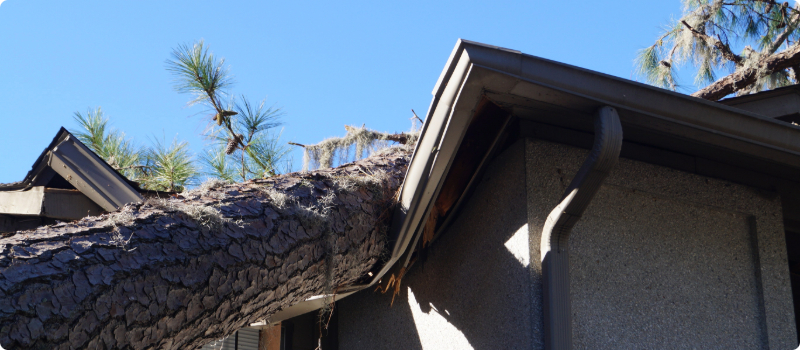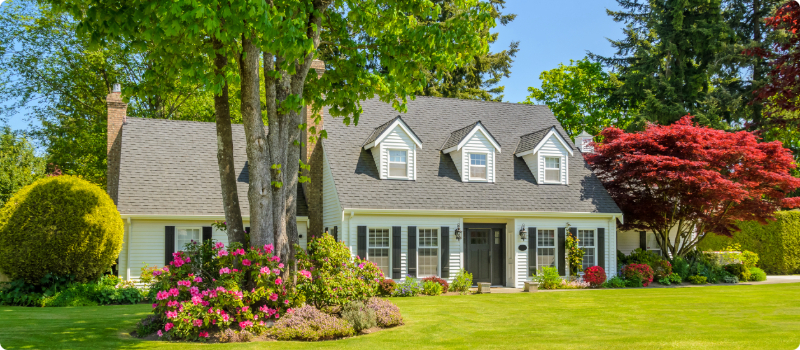What does homeowners insurance cover?
Updated July 30, 2025 . AmFam Team
Updated July 30, 2025 . AmFam Team
Homeowners insurance helps deliver peace of mind coverage for unexpected accidents involving your home, personal liabilities, and belongings. In other words, it allows policyholders to focus more on personal safety and less on losses during an emergency, such as a wildfire.
Your home insurance helps you financially recover, up to your policy's limits, if a covered loss damages your home and belongings. It also delivers additional protections, such as loss-of-use coverage, which helps pay for temporary housing up to your policy's limit after a covered loss leaves your home uninhabitable.
While standard home insurance helps many protect themselves from common perils, that's not true for everyone. Some homeowners are at a higher risk for events like flash floods, which require additional coverage.
Learn more about how standard and add-on home insurance coverages protect you.
If you're like many Americans, your home is one of the most significant purchases you will ever make. Homeowners insurance helps provide financial protection for your home and property after an accidental loss.
Standard home insurance policies include several coverages for common perils, each with coverage limits, which you can typically adjust. You can also buy home insurance add-ons for your policy to help cover regional perils, such as earthquakes or floods.
While you hope you'll never need to use it, home insurance can give you peace of mind by helping to protect one of the most valuable assets you may ever own.
When you purchase your home insurance policy, you may pay your premium in installments over time or in one lump sum. Staying on top of your premiums is vital to your coverage. Otherwise, the policy will lapse.
Your insurance policy's covered perils are the events that the coverage applies to, such as a tornado. The coverage limit is the maximum amount your insurer may pay to repair or replace your accident-related damages. Finally, your deductible is the amount you agree to pay before your insurer can cover their portion of a claim.
With an active home policy in place, let's say an accident occurs, such as a break-in, and the burglar destroys several windows, causing expensive damage to your home. They also get away with many of your costly valuables.
In this scenario, your home insurance policy has dwelling and personal property coverages, which help replace your windows and stolen valuables up to your coverage limits after you've paid your deductible.

Basic home insurance typically covers accidental losses that many homeowners face. It casts a wide net of protection with coverages for your home, belongings, and personal liabilities.
While not all home insurance policies are the same, a standard policy typically includes the following coverages:
Home insurance policies don't automatically cover uncommon events like earthquakes, which are typically a regional risk for some. Otherwise, many policyholders would be paying for coverages they don't need.
While not exhaustive, a standard home policy doesn't usually cover the following events.
Some listed coverages may be available as add-on coverage, which you may buy and add to your existing policy.
It's best to have enough coverage to help repair or replace your insured items.
For example, let's say repairing or replacing your jewelry would cost $1,500. If you’re an American Family Insurance policyholder, your basic home insurance includes personal property coverage that helps protect up to $2,000 of jewelry after a covered loss.

Many factors influence your policy premiums, but there are a few to consider while shopping for home insurance.
While you might not be able to change all your home insurance cost factors, you may be able to lower premiums by asking your American Family Insurance agent to look for qualifying discounts. They can also conduct a full policy review to ensure you're not paying for coverages you don't need.

Contact your American Family Insurance agent for a home insurance quote or a policy review. Your agent can also help answer additional coverage questions and look for qualifying home insurance savings programs, like our bundling discount.
Life's better when you're under our roof.
This article is for informational purposes only and based on information that is widely available. This information does not, and is not intended to, constitute legal or financial advice. You should contact a professional for advice specific to your situation.
The information on this webpage represents only a brief description of coverages, is not part of your policy, and is not a promise or guarantee of coverage. If there is any conflict between this information and your policy, the provisions of the policy will prevail. Insurance policy terms and conditions may apply. Coverage features and limits vary by state and may be subject to change. Some products are not available in every state. Discount availability and eligibility vary by state and policy terms. (Discounts apply to auto and property policies.) Please check with your agent and read the policy for exact details on coverages and exclusions.
*Hidden Water Damage coverage is an optional coverage. May not be available in all states. Some restrictions apply to seasonal homes and manufactured homes. The leak must occur from within a plumbing, heating, A/C, fire sprinkler or a home appliance. Refer to your policy documents for coverage limit details. Coverage applies after the property deductible has been met. Mold damage limited to coverage limits provided by your homeowners policy.
**Refer to your policy documents for coverage limit details. Coverage applies to covered losses only after a $500 deductible(s) has been met. Please speak with your agent to learn more about your coverage details and options.
Resources:
Is homeowner’s insurance tax deductible? What about premiums? (n.d.) H&R Block. https://www.hrblock.com/tax-center/filing/adjustments-and-deductions/is-homeowners-insurance-tax-deductible/